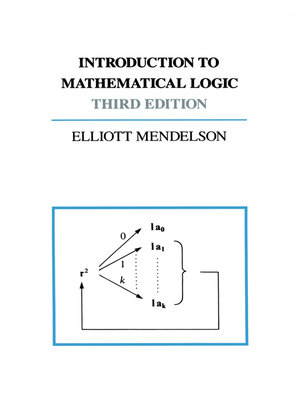Introduction to Mathematical Logic
ebook ∣ The Wadsworth & Brooks/Cole Mathematics Series
By Elliot Mendelsohn

Sign up to save your library
With an OverDrive account, you can save your favorite libraries for at-a-glance information about availability. Find out more about OverDrive accounts.
Find this title in Libby, the library reading app by OverDrive.



Search for a digital library with this title
Title found at these libraries:
| Library Name | Distance |
|---|---|
| Loading... |
This is a compact mtroduction to some of the pnncipal tOpICS of mathematical logic . In the belief that beginners should be exposed to the most natural and easiest proofs, I have used free-swinging set-theoretic methods. The significance of a demand for constructive proofs can be evaluated only after a certain amount of experience with mathematical logic has been obtained. If we are to be expelled from "Cantor's paradise" (as nonconstructive set theory was called by Hilbert), at least we should know what we are missing. The major changes in this new edition are the following. (1) In Chapter 5, Effective Computability, Turing-computabIlity IS now the central notion, and diagrams (flow-charts) are used to construct Turing machines. There are also treatments of Markov algorithms, Herbrand-Godel-computability, register machines, and random access machines. Recursion theory is gone into a little more deeply, including the s-m-n theorem, the recursion theorem, and Rice's Theorem. (2) The proofs of the Incompleteness Theorems are now based upon the Diagonalization Lemma. Lob's Theorem and its connection with Godel's Second Theorem are also studied. (3) In Chapter 2, Quantification Theory, Henkin's proof of the completeness theorem has been postponed until the reader has gained more experience in proof techniques. The exposition of the proof itself has been improved by breaking it down into smaller pieces and using the notion of a scapegoat theory. There is also an entirely new section on semantic trees.







